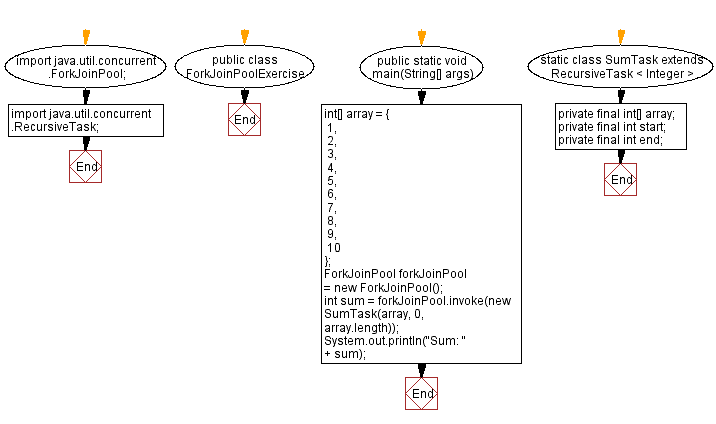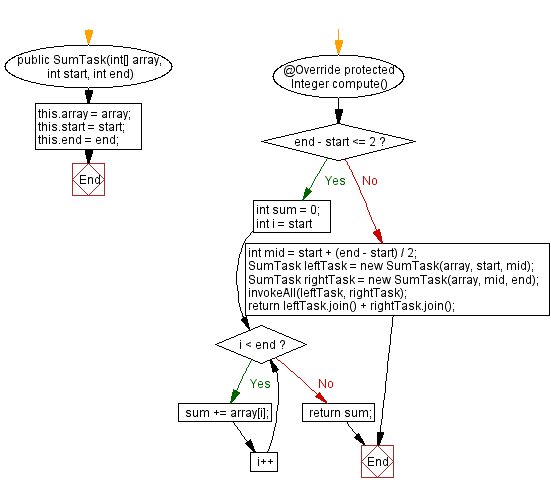Parallel Recursive Task Execution in Java with ForkJoinPool
14. Parallel recursion with ForkJoinPool
Write a Java program to demonstrate the usage of the ForkJoinPool class for parallel execution of recursive tasks.
Sample Solution:
Java Code:
import java.util.concurrent.ForkJoinPool;
import java.util.concurrent.RecursiveTask;
public class ForkJoinPoolExercise {
public static void main(String[] args) {
int[] array = {
1,
2,
3,
4,
5,
6,
7,
8,
9,
10
};
ForkJoinPool forkJoinPool = new ForkJoinPool();
int sum = forkJoinPool.invoke(new SumTask(array, 0, array.length));
System.out.println("Sum: " + sum);
}
static class SumTask extends RecursiveTask < Integer > {
private final int[] array;
private final int start;
private final int end;
public SumTask(int[] array, int start, int end) {
this.array = array;
this.start = start;
this.end = end;
}
@Override
protected Integer compute() {
if (end - start <= 2) {
int sum = 0;
for (int i = start; i < end; i++) {
sum += array[i];
}
return sum;
} else {
int mid = start + (end - start) / 2;
SumTask leftTask = new SumTask(array, start, mid);
SumTask rightTask = new SumTask(array, mid, end);
invokeAll(leftTask, rightTask);
return leftTask.join() + rightTask.join();
}
}
}
}
Sample Output:
Sum: 55
Explanation:
In the above exercise -
- "SumTask" is a subclass of RecursiveTask<Integer>, where Integer is the result type. It takes an array, a start index, and an end index as input parameters.
- In the compute() method, if the subarray size is small enough (in this case, 2 or fewer elements), it is possible to compute directly the sum of the subarray and return the result.
- Otherwise, we split the subarray into two halves and created two new SumTask instances for each half. We then use the invokeAll() method to submit both tasks to the ForkJoinPool for parallel execution. Finally, we return the sum of the results of both tasks using the join() method.
- The invoke() method is used to start the computation and retrieve the result. In this case, we store the sum in the sum variable and print it.
- When we run this program, the sum of the array elements is computed in parallel using the ForkJoinPool.
Flowchart:


For more Practice: Solve these Related Problems:
- Write a Java program to implement parallel sum of an array using ForkJoinPool and RecursiveTask.
- Write a Java program to compute the factorial of a large number using ForkJoinPool and compare it with sequential computation.
- Write a Java program to implement parallel merge sort using ForkJoinPool and RecursiveAction.
- Write a Java program to recursively count occurrences of a value in an array using ForkJoinPool and measure performance.
Go to:
PREV : Schedule tasks using ScheduledExecutorService.
NEXT : Optimize access with StampedLock.
Java Code Editor:
Improve this sample solution and post your code through Disqus
What is the difficulty level of this exercise?
Test your Programming skills with w3resource's quiz.
